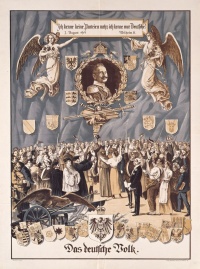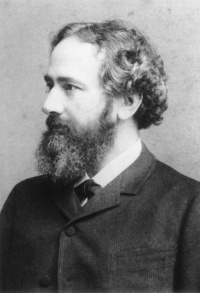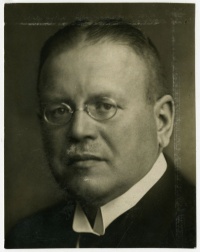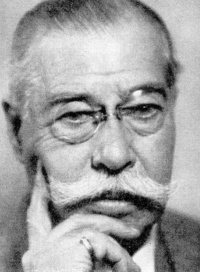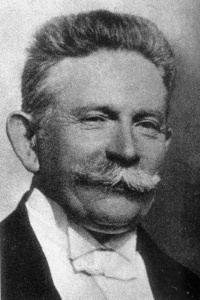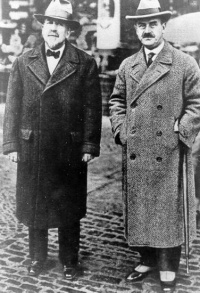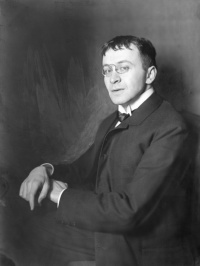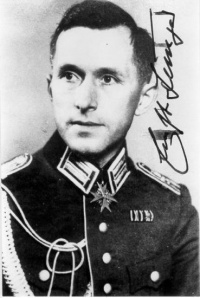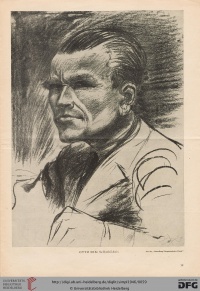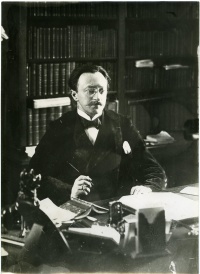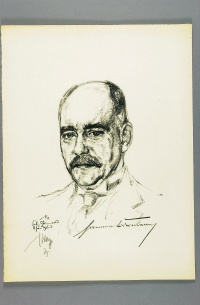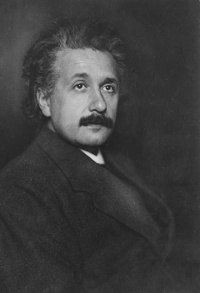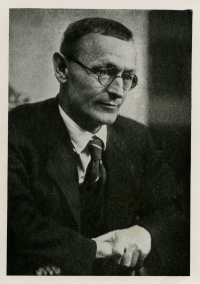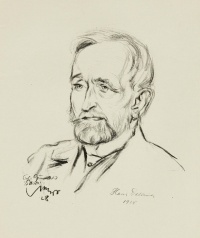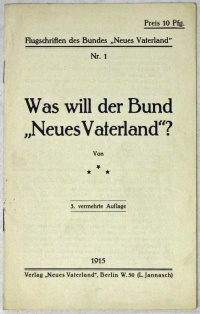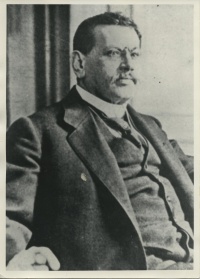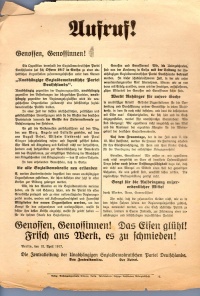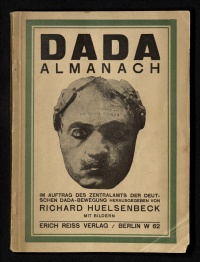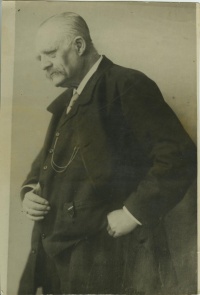Introduction↑
When, in the first days of August 1914, the five most powerful states in Europe entered the war, they brought about a situation that needed some justification to the public. Explanations for their own people in each country on the one hand, as well as those directed at global public opinion, especially in the neutral states, and particularly the United States. Already on the eve of the French-German War in 1870-1871, Adolphe Thiers (1797-1877) had debated the declaration of war on 15 July 1870 in the French Parliament, the Corps Législatif:
With regard to politics at home, Ernst Troeltsch (1865-1923) established on 1 July 1915 that:
This article will discuss the ways in which German intellectuals tried to influence public opinion abroad and in their own country. It will also discuss the ways in which they tried to influence the government. Finally, it will consider the consequences of the war for art and literature, as well as the education of children.
Regarding the literature that addresses German intellectuals during the First World War, Klaus Schwabe’s 1969 study was epoch-making. He made evident two stages of public opinion, first in expectation of victory (1914-1916) and then in the presence of the military-political crisis (1916-1918), highlighting the connection between the war aims debates and political reforms in Prussia. This interdependence is emphasized by Steven Welch (2000) as a main cause for the German defeat, while Steffen Bruendel (2003) scrutinizes the idea of political unanimity in the beginning, for example Burgfriede (political truce) and Ideen von 1914 (ideas of 1914), and its gradual disintegration throughout the war. With regard to individuals it is noteworthy that there are more studies on the altogether less numerous liberal writers.[4] Meanwhile there is excellent scholarship that addresses various aspects of the cultural developments taking place in artistic and literary realms during the war. Fundamental still is the impressive work of Helmut Fries (1994 and 1995), who studied the concept of moral crisis and decadence, which was widespread among artists and writers before the war and refered to their initial hope for a catharsis through war experience, and their inevitable disillusionment as the war dragged on. This line of research was followed by Barbara Beßlich (2000), who showed that the ideas of 1914 were prepared in many aspects already before the war. The works of Wolfgang Mommsen (1994 and 1996) and of Matthias Schöning (2009) deal in a wider sense with the developments of arts and literature in this period. Among scholars, special attention has been paid to the philosophers by Philippe Soulez (1988), Peter Hoeres (2004) and Ulrich Sieg (2013). It is remarkable that in the field of the philosophers comparative approach between the belligerent countries has been applied, which for many other aspects has to be desired yet. However, see the pioneering studies of Michael Jeismann (1992) on the concepts of national identity, and the corresponding Feindbild [Concept of the enemy] in France and Germany, Trude Maurer (2006) on the universities in war time, especially in Germany and Russia, and Stefan Goebel (2007) on the effects of medieval traditions in Britain and Germany. Jürgen von Ungern-Sternberg and Wolfgang von Ungern-Sternberg (2013) consider the interdependence of several declarations made by intellectuals on both sides of the front in the beginning of the war. Finally, with regard to the disastrous consequences of the war for the international scientific community, the works of Brigitte Schröder-Gudehus (1966) and Karl Dietrich Erdmann (1987) continue to be fundamental.
Der Krieg der Geister (The war with spiritual weapons)[5]↑
Whatever the true causes of the war were,[6] with Germany’s declaration of war against Russia and France coupled with her invasion of Belgium, public opinion about Germany abroad was quite negative. In France, old clichés were immediately mobilized. Already on 8 August the philosopher Henri Bergson (1859-1941), said as the president of the Académie des Sciences Morales et Politiques:
Bergson had been popular in Germany before the war and knew the country well, but now he forewent his former knowledge. So did many of his colleagues in the states involved, who accused Germany of barbarism without any restriction. In response, German artists and professors soon started to explain the German point of view to foreigners in neutral countries. They wrote private letters to colleagues and composed booklets with large numbers of copies, which they sent abroad. In some cases there was an exchange of open letters, for example, between the economists Lujo Brentano (1844-1931) and both Yves Guyot (1843-1928) and Guyotand Daniel Bellet (1864-1918).
Even more important was a new kind of levée en masse: the composing of manifestos, which were subscribed to by many professors and artists. Often, these and other propagandistic activities were coordinated in the background by the bureaus of different states: for example, in England the War Propaganda Bureau in Wellington House, in France the Maison de la Presse, and in Germany, first the Nachrichtenbüro der Reichsmarine, which sponsored the Aufruf ‘An die Kulturwelt!’ (An Appeal to the Civilized World), and later the Zentralstelle für Auslandsdienst, in the Foreign Office. However, this was of little importance because the authors strongly believed in the content of the declarations, despite who was organizing their distribution. Historians at the University of Bonn started this trend with a declaration on 1 September 1914 and and English intellectuals followed on 18 September with Britain’s "Destiny and Duty", which was published in the Times with fifty-three signatures. The most famous manifesto, however, the Aufruf ‘An die Kulturwelt!’ signed by ninty-three prominent scholars and artists (therefore often also called ‘Manifest of the 93’), was published on 4 October. Six times assuring “es ist nicht wahr” (it is not true), they denied that Germany should carry guilt for the war, and also denied that Germany had wantonly violated the neutrality of Belgium and that German soldiers had committed war crimes in Louvain (Löwen). The authors of the Aufruf, Ludwig Fulda (1862-1939), Georg Reicke (1863-1923) and Hermann Sudermann (1857-1928), were liberal writers of the Goethebund, an association of intellectuals, who had fought for cultural freedom in Germany before the war. Now they protested against the accusation of barbarism arguing, in fact, that Germany should be considered a Kulturvolk. Pretending to know the truth they behaved in the same way as almost everyone in each belligerent nation at the time, but the stout assertion “Es ist nicht wahr” rapidly became a symbol for the arrogance of German professors. In vain, a few dissenters like Albert Einstein (1879-1955) and Georg Friedrich Nicolai (1874-1964), tried to publish an Aufruf an die Europäer (Appeal to the Europeans), in which they appealed to the intellectuals in all countries to work for peaceful understanding. Hermann Hesse (1877-1962) also reacted critically to these assertions in his O Freunde, nicht diese Töne! (Oh friends, not these tones!).[8]
Other manifestos followed, for example the Erklärung der Hochschullehrer des Deutschen Reiches (Declaration of University Teachers of the German Empire) on 16 October, written by Ulrich von Wilamowitz-Moellendorff (1848-1931) and signed by several thousand colleagues. In this case it is even more clear that the declarations from the autumn of 1914 should be read as being a part of a “polemical conversation”.[9] In response to a British differentiation between Prussian militarism and German humanitarianism the signees felt obliged to emphasize their solidarity with the German armies fighting in war. But who, outside of Germany, could possibly appreciate such a reaction?
There were also several exchanges of letters and manifestos between Catholic and Protestant Christians living in the antagonistic countries.[10] Because the French Catholics emphasized the war against Protestant Germany, the German Catholics had to show that they could, at the same time, be loyal to the catholic community and to their fatherland. On the other hand the German Protestants underlined their Lutheran heritage, Ein feste Burg ist unser Gott (A Mighty Fortress is Our God). But all Christians in the belligerent countries tried to proclaim a holy war drawing on symbols from the medieval times on. However, whereas in Britain the offensive concept of a new crusade played an important part, the German Christians emphasized the sacrifice for their homeland in the name of defending their Heimat.[11] Since the beginning of October, the Zentralstelle für Auslandsdienst in the Foreign Office tried to coordinate all these activities. At the same time, the Kulturbund deutscher Gelehrter und Künstler (Cultural Association of German Scholars and Artists) was founded with the mission to influence public opinion abroad.
The problem was that nobody could really tell what Germany was fighting for, except for its own preservation and its position as one of the leading powers in Europe. England and France could mobilize the universal ideals of equality and freedom, i.e. the “ideas of 1789” (as they were called at this time in Germany in contrast to the “ideas of 1914”) and claim to fight for democracy (leaving aside the alliance with the tsar of Russia). Germany could not decline these attractive ideas. They could only try to explain their own cultural and political preferences, which were not well suited for export. Consequently, public statements made by intellectuals were increasingly geared towards the German public.
First, many speeches and papers in universities[12] were made with the goal of strengthening the unity of the nation. Wide-spread was the conviction, that German Kultur had to be defended against western civilization as Thomas Mann (1875-1955) argued in his Gedanken im Kriege (Thoughts in Wartime) (1914) and Betrachtungen eines Unpolitischen (Reflections of a Non-political) (1918).[13] Gradually the ideas of 1914 were further developed. This expression was first coined by Johann Plenge (1874-1963).[14] By this time these ideas were widely accepted by many, such as Rudolf Kjellén (1864-1922)[15] or Ernst Troeltsch.[16] Two experiences formed the basis for these ideas: the national harmony that appeared suddenly at the beginning of the war, known as Augusterlebnis (August Experience), and the efficient organization of the economy for the necessities of the war, for which Walter Rathenau (1867-1922) was responsible. Therefore‚ western individualism had to be replaced by comradeship, society by community (Gemeinschaft), and the contrast between capitalism and Marxism by socialism of the state in war (Staatssozialismus and Kriegssozialismus). Instead of the “western” conception of liberty, the “idea of German liberty” was developed: the voluntary integration into an organization. All this did not deny the ideals of liberté, égalité, fraternité but claimed to adapt them to the special German nature, or way of life (deutsches Wesen). The ideas of 1914 also had some roots dating back to the pre-war period. They were also drawn on to shape the conception of a specific German approach to development adopted in the 19th century called deutscher Sonderweg (German exceptionalism), which was in contrast to the rest of Western Europe.[17]
Many of these speeches and articles resulted from the heated atmosphere of war, and were therefore idiosyncratic and drew on shortsighted analysis of the problems of the day. They neither fully accounted for the political shortcomings of Imperial Germany nor did they realistically discuss the objective superiority of the combined forces of the Entente with regard to industrial capacity and manpower.[18] But there were also remarkable efforts to analyze the German past and present as Louis Dumont (1911-1998), a specialist of modern India with an outside perspective observed:[19]
Political controversies↑
At the beginning of the war there was an immediate and strict censorship of the newspapers by the commanders of the Army Corps, and beginning in February 1915, also by the Supreme Censorship Office (Oberzensurstelle) of the High Command (Oberste Heeresleitung). Public discussion of possible war aims was especially prohibited. However, the censorship was not as strict for books and periodicals, and in any case, memoranda and petitions to the government were still allowed. Thus, in an informal way, intellectuals gained more political influence than usual. Campaigns in the Affaire Dreyfus and the agitation of the Goethebund against the Lex Heinze had helped to prepare this effect.[21] The ideas of 1914 were central to the debate. These ideas originally had to explain and defend the special social and political system of the German Empire and to proclaim national concord. With the extension of the war discussions about the war aims and about the necessity of political reforms inevitably took place, especially in Prussia. These discussions were connected, because monarchists and radical Pan-Germans (Alldeutsche) hoped to stabilize the political status quo through a victorious war with great territorial annexations.
In the first period of the war, many overestimated the importance of German victories and developed plans for the expansion of the Empire. This was especially true in the case of Belgium, whose annexation or control as a protectorate was considered as a defensive measure against Great Britain in the case of future conflicts. One of the first memoranda was that of Matthias Erzberger (1875-1921) on 2 September 1914, which called for far-reaching annexations in Eastern and Western Europe and substantial reparations. This very much resembled the political goals of the Pan-Germans as they were formulated in the so-called Seeberg Adresse of 20 June 1915, which included 1,347 signatures (352 university teachers). The author was Reinhold Seeberg (1859-1935), professor of theology in Berlin, but he collaborated with the leader of the Alldeutsche, Heinrich Claß (1868-1953), and the industrialist Alfred Hugenberg (1865-1951). The moderate Delbrück Adresse of 9 July 1915, written by the historian Hans Delbrück (1848-1929) and the editor of the Berliner Tageblatt, Theodor Wolff (1868-1943), was signed only by 141 persons.
The idea of Mitteleuropa (Central Europe) gained significant attraction through the book of Friedrich Naumann (1860-1919), published in 1915.[22] However, the conception of a continental European block under the hegemony of the German Empire, intended to establish a balance against the British and Russian Empires, was also developed by Franz von Liszt (1851-1919) and Max Weber (1864-1920). Others, such as the Baltic Germans Theodor Schiemann (1847-1921) or Paul Rohrbach (1869-1956), focused more on the simultaneous disintegration of the Russian Empire and an increasing autonomy of the Eastern nations, under German influence, of course, but also in combination with a new colonization of German peasants in the Baltic region.
There were also a few intellectuals who struggled from the beginning of the war for a peace based on the status quo (Verständigungsfrieden). Some of them were organized in the Bund Neues Vaterland, for example Albert Einstein, Ludwig Quidde (1858-1941) and Walther Schücking (1875-1935). Already in 1915 Schücking heavily criticized his colleagues’ declarations.[23] Many of them became members in the Deutsche Gesellschaft 1914 (German Society 1914), founded on 28 November 1915, which aimed to conserve the spirit of national harmony in the beginning of the war. In reality, however, the scholars split into two separated camps as a consequence of the addresses in summer 1915: the annexionists like Seeberg and Dietrich Schäfer (1845-1929), organized in the Unabhängiger Ausschuss für einen Deutschen Frieden (Independent Committee for a German Peace) and aiming for a Siegfrieden (Victory Peace), and the moderates, like Hans Delbrück, organized in the Deutscher National-Ausschuss für einen ehrenvollen Frieden (German National Committee for an Honorable Peace), who preferred a Verständigungsfrieden (Negotiated Peace). However, even this group was not entirely against German annexations in the East. Some of the annexationists like Schäfer and Eduard Meyer (1855-1930) were protagonists for the declaration announcing the unrestricted use of submarines on 1 February 1917, which was one of the main reasons that the United States chose to participate in the war.
As the war dragged on and the food situation deteriorated, the debate about the future political structure of the German Empire became more and more urgent. One of the first writers was Hugo Preuß (1860-1925), who wanted to replace the Obrigkeitsstaat (Authoritarian State) through the participation of all citizens in a Volksstaat.[24] The main target of the reformers was the Dreiklassenwahlrecht (three-class electoral system) in Prussia. Answering propositions of Friedrich Meinecke (1862-1954),[25] Max Weber and others, the Chancellor of the Empire, Theobald von Bethmann Hollweg (1856-1921) promised reforms in the Reichstag on 27 February 1917, but only very vaguely. The same was true in the subsequent Easter message (Osterbotschaft) delivered by the Emperor.
Problems of foreign policy and of inland-reforms merged, when the Reichstag adopted a motion introduced by Erzberger from the Zentrum and some leading social democrats for a Verständigungsfrieden (Negotiated Peace) or Friedensresolution (Peace Resolution) on the 19 July 1917. In reaction to this, Schäfer, Meyer, Georg von Below (1858-1927) and other scholars founded the Deutsche Vaterlands-Partei (German Fatherland Party) on 23 August 1917, with Grand Admiral Alfred von Tirpitz (1849-1930) as its chairman. It was not a party in the strict sense, but an extreme nationalistic movement in opposition to the majority of the Reichstag. The Reichstag was supported by the moderates, who gathered forces in December 1917 in the Volksbund für Freiheit und Vaterland (National Association for Freedom and Fatherland). Both movements turned obsolete with the November revolution of 1918, but they did anticipate the political controversies in the republic of Weimar. The left side of the political spectrum split in the same way. The leaders of the Social Democratic Party were heavily criticized by many for their extensive support of the government without any substantial political concessions. The Independent Social Democratic Party (USPD) was founded in April 1917. Even the more radical Spartacus group around Rosa Luxemburg (1871-1919) and Karl Liebknecht (1871-1919) joined this grouping for tactical reasons.
War-culture↑
The idea that there was a general enthusiasm in the belligerent countries at the outbreak of the war[26] has been modified by scholars in the last decades. Only some crowds in the capitals joyfully greeted the war, whereas farmers and workers saw no advantages in leaving their farmsteads and families.[27] But for many intellectuals the sudden experience of national harmony was a moment of relief, which was combined with the agreeable feeling that they were needed in this situation. People confronted with fundamental changes brought about by war were eager to listen to the speeches of scholars and the sermons of clergymen, as well as to read poems and essays.
First there was a flood of poems,[28] now primarily forgotten except for three of the most unique: Grodek, which focused on the cruelty of war, by Georg Trakl (1887-1914), who died in a military hospital in Cracow, the “Haßgesang auf England” (Song of hatred to England) by Ernst Lissauer (1882-1937), and the romantic song “Wildgänse rauschen durch die Nacht” (Wild Geese Rushing Through the Night), which Walter Flex (1887-1917) inserted in his widely distributed book Der Wanderer zwischen beiden Welten (The Wanderer Between Two Worlds) (1916). Lilli Marleen, written by Hans Leip (1893-1983) in 1915, turned popular only during the Second World War.
Many writers greeted the end of decadence with hopes for catharsis through the Stahlbad[29] of the war. They pleaded for a revival of national culture and argued against foreign influences in art and literature, or against Ausländerei (Love for everything Foreign). That was especially curious in the case of Ludwig Fulda,[30] who had been decorated with the légion d’honneur (Legion of Honour) for his translations of French literature. However, like the scholars, the poets tried to minimize all foreign influence, which included ignoring what they had learned abroad previously, and also forgetting their foreign friends living in the now hostile countries. The continuous exchange of letters between Romain Rolland (1866-1944) and Stefan Zweig (1881-1942) remains unparalleled.[31] Even for them, however, it was sometimes difficult to reach a true mutual understanding, because they had incomplete information about the events of the war, especially the accusations against German behaviour in Belgium, or respectively, Russian behaviour in Galicia.[32]
Some authors like Richard Dehmel (1863-1920), Ludwig Ganghofer (1855-1920), Hermann Löns (1866-1914) and Robert Musil (1880-1942), entered the army as volunteers and wrote about their experiences. Especially the young expressionist poets and painters felt attracted to the war as redemption from their monotonous daily life. Many died on the battlefields, including Alfred Lichtenstein (1889-1914), August Macke (1887-1914), August Stramm (1874-1915) and Franz Marc (1880-1916).
While some writers, such as Hermann Bahr (1863-1934), Rudolf Borchardt (1877-1945), Gerhart Hauptmann (1862-1946) and Thomas Mann, were in support of the ‘official’ German point of view, others were reserved or even critical. For example, Heinrich Mann (1871-1950) in his essay on Émile Zola (1840-1902),[33] and Annette Kolb (1870-1967), René Schickele (1883-1940)[34] and above all Karl Kraus (1874-1936), who wrote Die letzten Tage der Menschheit (The Last Days of Mankind), between 1915 and 1922.
The most influential books were written only after the war: Ernst Jünger’s (1895-1998) In Stahlgewittern. Aus dem Tagebuch eines Stoßtruppführers (Storm of Steel. From the Diary of a Strike Team Leader) (1920) and Erich Maria Remarque’s (1898-1970) Im Westen nichts Neues (All Quiet on the Western Front) (1929). The same was true for the fine arts, Ernst Barlach (1870-1938), Max Beckmann (1884-1950), Otto Dix (1891-1969) and George Grosz (1893-1959), all took part in the war and artistically reprocessed their experiences afterwards in dreadful pictures of the war. Most impressive is the Triptychon Der Krieg of Otto Dix (1929-32) housed in the Dresden Gallery.[35]
Official war-painters were sent to the front, for example Max Slevogt (1868-1932) in the West, who was rapidly disillusioned, and Hugo Vogel (1855-1934), the portraitist of Paul von Hindenburg (1847-1934) in the East. One of the more original responses to the absurdity of the war was Dada, a loose association of artists and writers, which started in 1916 with the Cabaret Voltaire in Zürich, and became very influential for the development of modern art. Among its first members were Hugo Ball (1886-1927), Emmy Hennings (1885-1948), Tristan Tzara (1896-1963), Hans Arp (1886-1966), Sophie Taeuber-Arp (1889-1943) and Richard Huelsenbeck (1892-1974).
The war also led to a rapid development of propaganda by means of new mass-media. Photographs and post-cards illustrated the war in official and censured pictures.[36] Posters were widely used to propagate the legitimacy of one side, but especially to advertise war-loans, which were absolutely necessary in order to finance the war.[37] Cartoons were used to expose and ridicule the enemies.[38] For the German film-industry the war was crucial. Erich Ludendorff (1865-1937) fully appreciated the significance of the movies for the Anglo-Saxon propaganda. Consequently, on 18 December 1917, the Universum Film AG (UFA) was founded, which played a very important role for the German film industry over the next decades.[39]
Special attention was paid to children. In a way, German history text-books had a similar problem as that of the German intellectuals with respect to their French colleagues: It was quite impossible to find a ‘German mission’ for the world, as France had done drawing on the heritage of the French Revolution. Therefore they were more concerned with promoting loyalty to the state and the dynasty according to the ideas of 1914.[40] However, there were indeed a lot of books for children on the subject of the war.[41]
Conclusion↑
The assurance to carry out a bellum iustum (just war) may be as old as war itself, and we can find debates about the guilt of war dating back to antiquity. In 1914 however, immediately after entering the war, it was evident that this debate had received a new dimension. The need to justify a war between millions of not only soldiers, but citizens, which affected the entire population, not only in the belligerent, but also in neutral countries, was urgent. While England and France could claim a universal mission to fight for democracy and freedom, Germany neither had such a mission nor was it clear what the objectives of the war were. As a result, the German arguments were on the one hand rather defensive and in a way even idiosyncratic. On the other hand, however, they were often more thorough and accurate in reflecting on the national character of Germany at the time. Most people outside of Germany were unable or unwilling to appreciate this quality. The consequence was an embitterment on the part of many Germans, which was additionally nourished by the defeat and the revolution in November 1918, the Treaty of Versailles, and the boycott of the German scholars by the international League of Academies in the next decade. In this way, the Krieg der Geister of 1914-18 had a disastrous and continuous impact on the subsequent events.
Jürgen von Ungern-Sternberg, University of Basel
Section Editor: Christoph Cornelißen
Notes
- ↑ “In a very long time of peace there cannot be so many absurd and untrue utterances of men as in a very short time of war.”) Unless stated otherwise, all translations are by the author.
- ↑ “Because there is one thing I notice about our century: that we can no longer make war capriciously; it is necessary that nations, who watch the war like witnesses in a duel, approve you , that they support its esteem and its vows. It is necessary, in a word, to have the world’s opinion on side.” Ollivier, Émile: L’Empire libéral. Études, récits, souvenirs, vol. 14, Paris 1909, p. 435.
- ↑ “Democratized nations make wars only as wars of the whole people, only on the basis of moral reasons which are evident to everybody [...] The natural consequence therefore is, that such nations want only to make wars as defensive wars in order to maintain or to preserve their nation in its political existence or in its spiritual-ethical content.” From “Der Kulturkrieg”, in: Deutsche Reden in schwerer Zeit, vol. 3, Berlin 1915, pp. 218f. By the way, it was clear for Troeltsch, that Germany in that sense was a democratized nation.
- ↑ For example Eberhard Demm (1990) on Alfred Weber, Stefan Meineke (1995) on Friedrich Meinecke and Bernd Sösemann (2012) on Theodor Wolff, but cf. Kurt Sontheimer (2002) on the conservative Thomas Mann, and Jens Ackermann (2004) on the reactionary Dietrich Schäfer.
- ↑ Kellermann, Hermann: Der Krieg der Geister. Eine Auslese deutscher und ausländischer Stimmen zum Weltkriege 1914, Dresden 1915 continues to be the most comprehensive collection for the first months of the war.
- ↑ Clark, Christopher: The Sleepwalkers. How Europe went to War in 1914, London 2012.
- ↑ Mélanges, Paris 1972, p. 1102.
- ↑ Neue Zürcher Zeitung, 3 November 1914, Morgenblatt.
- ↑ Ungern-Sternberg, Jürgen von: Wie gibt man dem Sinnlosen einen Sinn? Zum Gebrauch der Begriffe “deutsche Kultur” und “Militarismus” im Herbst 1914, in: Mommsen, Wolfgang J. (ed.): Kultur und Krieg. Die Rolle der Intellektuellen, Künstler und Schriftsteller im Ersten Weltkrieg, Munich 1996, pp. 77-96.
- ↑ Pfeilschifter, Georg: Deutsche Kultur, Katholizismus und Weltkrieg, Freiburg 1915; Besier, Gerhard: Die protestantischen Kirchen Europas im Ersten Weltkrieg, Göttingen 1984.
- ↑ Hammer, Karl: Deutsche Kriegstheologie 1870-1918, Munich 1971; Scheidgen, Hermann-Josef: Deutsche Bischöfe im Ersten Weltkrieg, Cologne 1991; Goebel, Stefan: The Great War and Medieval Memory. War, remembrance and Medievalism in Britain and Germany, 1914-1940, Cambridge 2007.
- ↑ A well-known source for this is: Deutsche Reden in schwerer Zeit, 3 vols., Berlin 1914-1915; Hintze, Otto et al. (eds.): Deutschland und der Weltkrieg, 2nd edition, 2 volumes, Leipzig and Berlin 1915.
- ↑ Reed, Terence J.: Thomas Mann. The uses of tradition, Oxford 1996, pp. 179-225.
- ↑ Der Krieg und die Volkswirtschaft, Münster 1915.
- ↑ Die Ideen von 1914, Leipzig 1915.
- ↑ Die Ideen von 1914, in: Die neue Rundschau 27 (1916), pp. 605-624.
- ↑ To learn more about the influence of these ideas on German literature in the war and during the republic of Weimar see Schöning, Matthias: Versprengte Gemeinschaft. Kriegsroman und intellektuelle Mobilmachung in Deutschland, 1914-1933, Göttingen 2009.
- ↑ In contrast to the brillant analysis of Émile Durkheim, Lavisse, Ernest: Lettres à tous les Français, Paris 1916.
- ↑ L’idéologie allemande. France-Allemagne et retour, Paris 1991, p. 60 n.1.
- ↑ These texts are inseparable from the conditions of the war during which they appeared. The German intellectuals tried eagerly to answer the challenge of enemy’s propaganda, which in their eyes was terrible, but their seriousness in these efforts is equally impressive as is the importance of this literature from wartime for my purpose – especially, but not exclusively, the studies of Troeltsch.
- ↑ With the lex Heinze the conservative and Catholic parties of the Reichstag (the German Parliament) tried to introduce censorship for modern movements in art and literature since 1899. Against this purpose many artists and scholars protested. In 1900 they founded the Goethebund in several cities, e.g. in Berlin and Munich, in order to organize their opposition in this case as in further similar attempts. The Goethebund was still active in 1914.
- ↑ Naumann, Friedrich: Mitteleuropa, Berlin 1915.
- ↑ Die deutschen Professoren und der Weltkrieg, Berlin 1915.
- ↑ Das deutsche Volk und die Politik, Jena 1915.
- ↑ Meinecke, Friedrich: Die Reform des preußischen Wahlrechts, in: Probleme des Weltkriegs, Berlin (1917), pp. 83-125.
- ↑ See the description by Zweig, Stefan: Die Welt von Gestern. Erinnerungen eines Europäers, Stockholm 1942 (The World of Yesterday, New York 1943).
- ↑ Cf. the local studies of Stöcker, Michael: Augusterlebnis 1914, in Darmstadt. Legende und Wirklichkeit, Darmstadt 1994; Geinitz, Christian: Kriegsfurcht und Kampfbereitschaft. Das Augusterlebnis in Freiburg. Eine Studie zum Kriegsbeginn 1914; Fulda 1998; Raithel, Thomas: Das “Wunder” der inneren Einheit. Studien zur deutschen und französischen Öffentlichkeit bei Beginn des Ersten Weltkrieges, Bonn 1996 and Verhey, Jeffrey: The spirit of 1914. Militarism, myth and mobilization in Germany, Cambridge 2000.
- ↑ Bab, Julius: Die deutsche Kriegslyrik 1914-1918. Eine kritische Bibliographie, Stettin 1920.
- ↑ Literally: bathing in a chalybeate spring; Figuratively: the experience of gun fire or shelling.
- ↑ Ausländerei, Berliner Tageblatt, 3 September 1914 (A).
- ↑ Briefwechsel 1910-1940, 2 vols., Berlin 1987.
- ↑ For example, see Rolland in his letter from 15 March 1915: “Your letter shows to me once again, that it is quite impossible to converse by letters about political matters. Because each of us knows only one side and does not know anything about the other one.” He continues hopefully: “Later on when we are able to exchange freely our different knowledges we will come nearly to the same judgments, that’s my conviction. But for the moment it is impossible.” Unlike others Rolland and Zweig were able to handle the problem.
- ↑ Die weißen Blätter 2, 1915, 1348-1349.
- ↑ Debrunner, Albert M.: Freunde, es war eine elende Zeit! René Schickele in der Schweiz 1915-1919, Frauenfeld 2004.
- ↑ For the afterlife of the war of culture in the Third Reich see the useful contributions in: Krumeich, Gerd (ed.): Nationalsozialismus und Erster Weltkrieg, Essen 2010.
- ↑ For the possibility of falsifications cf. the classic essay of Avenarius, Ferdinand: Das Bild als Verleumder. Bemerkungen zur Technik der Völkerverhetzung, Munich 1915; for a special case (after the war) see Krumeich, Gerd: Hitler dans la foule, 14-18 in Noêsis, Revue annuelle d’histoire 1 (1998), pp. 8-12.
- ↑ Rother, Rainer (ed.): Die letzten Tage der Menschheit. Bilder des Ersten Weltkrieges, Berlin 1994; Der Weltkrieg 1914-1918. Ereignis und Erinnerung, Berlin 2004 (exhibition-catalogues); Also, a good case-study is Bruendel, Steffen: Vor-Bilder des Durchhaltens. Die deutsche Kriegsanleihe-Werbung 1917/18, in: Bauerkämper, Arnd and Julien,Elise (eds.): Durchhalten! Krieg und Gesellschaft im Vergleich 1914-1918, Göttingen 2010, pp. 81-108.
- ↑ Demm, Eberhard: Der Erste Weltkrieg in der internationalen Karikatur, Hannover 1988.
- ↑ Oppelt, Ulrike: Film und Propaganda im Ersten Weltkrieg, Stuttgart 2002.
- ↑ Bendick, Rainer: Kriegserwartung und Kriegserfahrung. Der Erste Weltkrieg in deutschen und französischen Schulgeschichtsbüchern (1900-1939/45), Pfaffenweiler 1999.
- ↑ Demm, Eberhard: Zwischen Propaganda und Sozialfürsorge – Deutschlands Kinder im Krieg, in: idem, Ostpolitik und Propaganda im Ersten Weltkrieg, Frankfurt 2002, pp. 71-131.
Selected Bibliography
- Ackermann, Jens P.: Die Geburt des modernen Propagandakrieges im Ersten Weltkrieg. Dietrich Schäfer, Gelehrter und Politiker, Frankfurt a. M.; New York 2004: P. Lang.
- Besslich, Barbara: Wege in den 'Kulturkrieg'. Zivilisationskritik in Deutschland 1890-1914, Darmstadt 2000: Wissenschaftliche Buchgesellschaft.
- Bruendel, Steffen: Volksgemeinschaft oder Volksstaat. Die 'Ideen von 1914' und die Neuordnung Deutschlands im Ersten Weltkrieg, Berlin 2003: Akademie Verlag.
- Demm, Eberhard: Der Erste Weltkrieg (1914-1918), in: idem.: Ein Liberaler in Kaiserreich und Republik: der politische Weg Alfred Webers bis 1920, Boppard am Rhein 1990: H. Boldt, pp. 152-255.
- Erdmann, Karl Dietrich: Die Ökumene der Historiker. Geschichte der Internationalen Historikerkongresse und des Comité international des sciences historiques, Göttingen 1987: Vandenhoeck & Ruprecht.
- Flasch, Kurt: Die geistige Mobilmachung. Die deutschen Intellektuellen und der Erste Weltkrieg. Ein Versuch, Berlin 2000: Alexander Fest.
- Fries, Helmut: Die grosse Katharsis. Der Erste Weltkrieg in der Sicht deutscher Dichter und Gelehrter, 2 volumes, Konstanz 1994: Verlag am Hockgraben.
- Goebel, Stefan: The Great War and medieval memory. War, remembrance and medievalism in Britain and Germany, 1914-1940, Cambridge; New York 2007: Cambridge University Press.
- Hoeres, Peter: Krieg der Philosophen. Die deutsche und die britische Philosophie im Ersten Weltkrieg, Munich 2004: Schöningh.
- Jeismann, Michael: Das Vaterland der Feinde. Studien zum nationalen Feindbegriff und Selbstverständnis in Deutschland und Frankreich, 1792-1918, Stuttgart 1992: Klett-Cotta.
- Maurer, Trude (ed.): Kollegen, Kommilitonen, Kämpfer. Europäische Universitäten im Ersten Weltkrieg, Stuttgart 2006: Steiner.
- Meineke, Stefan: Friedrich Meinecke. Persönlichkeit und politisches Denken bis zum Ende des Ersten Weltkrieges, Berlin; New York 1995: Walter de Gruyter.
- Mommsen, Wolfgang J.: Bürgerliche Kultur und künstlerische Avantgarde. Kultur und Politik im deutschen Kaiserreich 1870 bis 1918, Frankfurt a. M.; Berlin 1994: Ullstein; Propyläen.
- Mommsen, Wolfgang J. / Müller-Luckner, Elisabeth (eds.): Kultur und Krieg. Die Rolle der Intellektuellen, Künstler und Schriftsteller im Ersten Weltkrieg, Munich 1996: Oldenbourg.
- Müller, Sven Oliver: The never ending story. The unbroken fascination of the history of the First World War, in: Bulletin of the German Historical Institute London/25 , 2003, pp. 22-55.
- Peschel, Andreas: Friedrich Naumanns und Max Webers 'Mitteleuropa'. Eine Betrachtung ihrer Konzeptionen im Kontext mit den 'Ideen von 1914' und dem Alldeutschen Verband, Dresden 2005: TUDpress.
- Rotte, Ralph: Vom 'Zwiespalt der Kulturen' zum 'Clash of Civilizations'. Das exemplarische Scheitern des Liberalen Friedens 1914 und seine Lehren für die internationale Politik der Gegenwart, Neuried 2002: Ars et Unitas.
- Schöning, Matthias: Versprengte Gemeinschaft. Kriegsroman und intellektuelle Mobilmachung in Deutschland 1914-1933, Göttingen 2009: Vandenhoeck & Ruprecht.
- Schwabe, Klaus: Wissenschaft und Kriegsmoral. Die deutschen Hochschullehrer und die politischen Grundfragen des Ersten Weltkrieges, Göttingen 1969: Musterschmidt-Verlag.
- Sieg, Ulrich: Geist und Gewalt. Deutsche Philosophen zwischen Kaiserreich und Nationalsozialismus, Munich 2013: Hanser.
- Sontheimer, Kurt: Thomas Mann und die Deutschen, Munich 1961: Nymphenburger Verlagshandlung.
- Sösemann, Bernd: Theodor Wolff. Ein Leben mit der Zeitung, Stuttgart 2012: Franz Steiner Verlag.
- Soulez, Philippe / Balibar, Etienne: Les Philosophes et la guerre de 14, Saint-Denis 1988: Presses universitaires de Vincennes.
- Ungern-Sternberg, Jürgen von / Ungern-Sternberg, Wolfgang von: Der Aufruf 'An die Kulturwelt!' Das Manifest der 93 und die Anfänge der Kriegspropaganda im Ersten Weltkrieg (2 ed.), Frankfurt a. M. 2013: Lang-Ed..
- Verhey, Jeffrey: The spirit of 1914. Militarism, myth and mobilization in Germany, Cambridge; New York 2006: Cambridge University Press.
- Welch, David: Germany, propaganda, and total war, 1914-1918. The sins of omission, New Brunswick 2000: Rutgers University Press.





